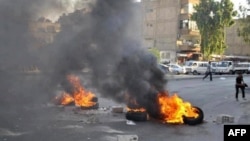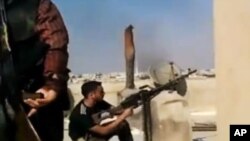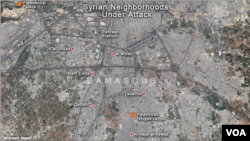Fierce clashes between rebels and government forces rocked the Syrian capital for a third day Tuesday in the heaviest period of fighting in the city since the revolt against President Bashar al-Assad began 16 months ago.
The sounds of gunfire and tank shells reverberated across large parts of Damascus, bringing the popular rebellion a notch closer to the center of power. Eyewitnesses say fighting engulfed parts of Baghdad Street, a major boulevard in the center of the city.
Amateur video showed plumes of black smoke rising over the city's skyline, as helicopters circled several key districts. Many residents are reported to have fled the hardest hit regions of the capital.
Abou Mourad, a resident of the Midan district, speaking over the sounds of gunfire, told Alhurra TV that heavy fighting was engulfing the area.
Rebels hail offensive
Free Syrian Army commander Qassem Saad al-Din told the French news agency, AFP, that "the battle for Damascus has begun."
Syrian state TV showed a brief video of its correspondent in the Midan district, claiming that "all is quiet."
The government-run TV also showed images of a burnt-out electricity sub-station, claiming that rebel forces had destroyed it.
Electricity Minister Imad Khamis said that sabotage of the electrical sub-station has cut power supplies in the east of the capital and some suburbs. He said the government is trying to repair and bring the station back online.
Khattar Abou Diab, who teaches political science at the University of Paris, says the battles taking place in Damascus are part of a government offensive against rebel positions.
He says that rebel fighters retreated into Damascus after suffering reverses in the suburbs during a government offensive. Diab says that the Free Syrian Army retreat took government forces by surprise, but says the government has enough loyal forces to fend off the rebels.
Continued diplomacy
The battles come as faltering efforts at diplomacy continue.
British Foreign Secretary William Hague said during a visit to Jordan that it is "imperative to have a Chapter 7 resolution" of the United Nations Security Council to mandate the implementation of a peace plan brokered in April by envoy Kofi Annan. That plan has failed to take hold amid continuing fighting between the government and rebels.
Article 41 of Chapter 7 calls for the imposition of sanctions in cases where "peace is threatened."
In Moscow, Russian Foreign Minister Sergei Lavrov said he sees no reason why the Security Council cannot find a consensus for a resolution on the Syria crisis. He spoke after a meeting between Mr. Annan and Russian President Vladimir Putin.
China and Russia have vetoed previous Western-backed Security Council resolutions calling for tough action against Syria.
U.N. Secretary-General Ban Ki-moon is heading to China for talks with President Hu Jintao. The official People's Daily newspaper ran a commentary Tuesday rejecting foreign intervention in the Syrian crisis.
"Sovereign equality and noninterference in internal affairs is a red line that must not be crossed," the commentary said. "A political solution is the only way out of the Syrian problem."
Yeranian reported from Cairo. Some information was provided by AP, AFP and Reuters.






